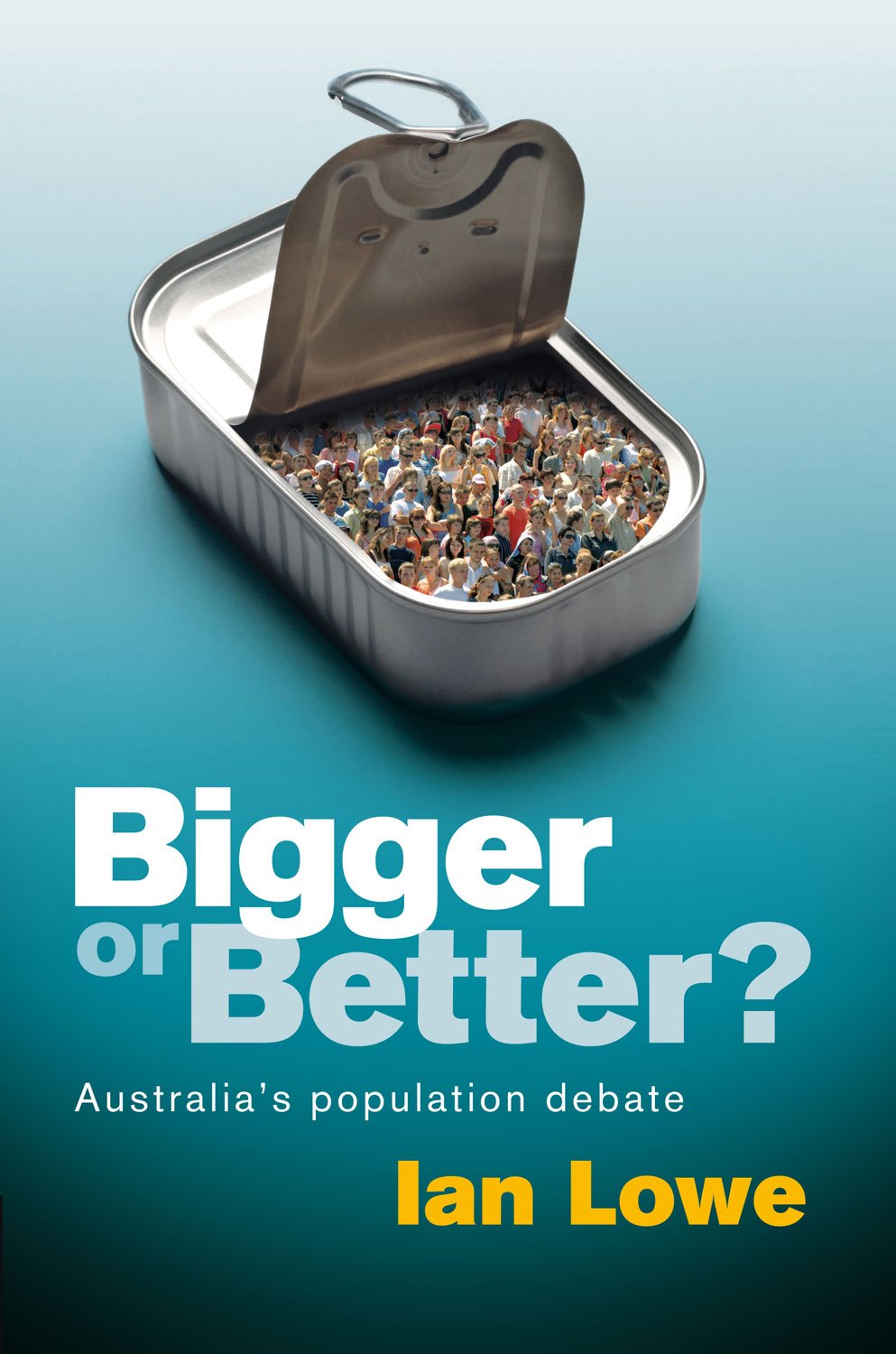Bigger or Better: Australia's population debate
by Ian Lowe
Penguin, 2012, 208 pages
 The false dichotomy offered in the title of Ian Lowe's book Bigger or Better: Australia's population debate hints at the one-sided polemic contained within.
The false dichotomy offered in the title of Ian Lowe's book Bigger or Better: Australia's population debate hints at the one-sided polemic contained within.
Lowe puts a forthright case for "stabilising" Australia's population at or near current levels by cutting migration, particularly skilled migration.
But Lowe's argument for lowering skilled immigration to a point where Australia's population stabilises is utterly confused.
Firstly, it is never clear throughout Bigger or Better? whether Lowe's main gripe is against global population growth in general or Australian population growth in particular. Apart from Australian society's "wastefulness" compared with poorer societies, the arguments he puts forth only apply to global population growth.
Using his own favoured method of economic and demographic analysis (back of the envelope calculations), if the global population is 6.97 billion and Australia's population 22.6 million, and Australia's net migration rate is 180,000 a year, that net migration rate affects the world's population exactly zero.
But even if net migration to Australia is the source of the world's woes, what exactly is Lowe suggesting?
Lowe seems to suggest that because Australians use more resources than those in poor countries ― including raw materials, fossil fuels, water and food ― the 180,000 people who might otherwise call Australia home should not be introduced to our resource-intensive lifestyles and instead be kept in the less wasteful state they are in. In other words, in order to ensure the planet's resources are not overused, it is important that we safeguard our own wasteful, prosperous way of life and keep others in poverty.
As you might expect, Lowe is never so bold as to put it in these terms, but it is the only logical end-point of his opposition to population growth and his preferred policy solution of low migration to Australia.
Secondly, a problem that plagues Bigger or Better? is its inability to grapple with basic economic concepts. He never canvasses the advantages of economies of scale, never supposes that prices can manage scarce resources or that necessity leads to efficiencies and innovation. He worries about Australia's terms of trade when our endowment of natural resources, like iron ore and coal, run out sometime next century, never supposing that we, that is to say the market, might find a solution or a substitute without central planning.
Thirdly, Lowe argues that because humanity is endowed with the capacity for reason, it should decide its population and pursue it through policy. He ignores the other side of reason; that humanity is able to adapt its surroundings through the very faculties Lowe says compel humanity to choose a no-growth future.
Lowe should visit Israel. He could see how nearly 8 million people live affluent lives in what is mostly arid desert using innovative irrigation practices and water conservation. Israel's area is one third of Tasmania's, is largely uninhabitable, but has one third the total population of Australia. Despite this, Israel's population growth rate remains higher than Australia's.
It is not hard to imagine the incredulity of an Israeli if they chanced upon Lowe's book; they'd probably think the idea that Australia is under threat of overpopulation a neat joke.
Although it isn't central to Lowe's thesis, it is worth mentioning his eagerness to argue that stopping immigration will lessen racial strife in Australia. Despite Australia's overwhelming success as a immigrant society, Lowe sees imminent Cronulla Riots wherever he looks. If Australia continues to allow hundreds of thousands of migrants to enter Australia, Australia's "social fabric" and "social cohesion" will come under threat, according to Lowe.
Dog-whistling? The Australian left spent years accusing conservative politicians like John Howard of using such tactics. But Lowe ― the President of the Australian Conservation Foundation ― unwittingly demonstrates there is more similarity in views between no-growth greens and One Nation-style protectionists than he might like to admit.
Lowe is also needlessly partisan.
The book is peppered with references to the "Murdoch Press". Tony Abbott is described as "generally supporting a population growth agenda", which is, unfortunately, not strictly accurate. After gleeful accounts of Greens dominated local councils stopping growth throughout the country, Lowe even finds space to attack me for pointing out the common ground between greens and ultranationalists on immigration.
At one point, Lowe links transport congestion to the pro-natalist policies of the former Howard government (such as the baby bonus). Personally, I'm yet to see a primary school age kid driving in heavy traffic. Sure, the mini baby boomers born in the 2000s will eventually add to traffic congestion. But since 2011 there are now more Australians leaving the workforce due to age than entering it, so our transport issues will need to be blamed on something else.
Worst of all, Lowe is incapable of looking beyond Green shibboleths. This is most plain during his feeble rebuttal of nuclear power. Echoing Bob Brown's National Press Club speech of 7 April 2010, Lowe revives the classic Greens Party non-sequitur that because the ingredient of nuclear power can also be used for nuclear weapons, we should not pursue nuclear power. This is probably Lowe's biggest insult to the intelligence of his audience.
The range of logical errors like this, things taken as assumed and feeble rebuttals of major counter-arguments suggests this book was never meant to reach outside the green belt-way. For Lowe's sake, he should hope it isn't.
No comments:
Post a Comment